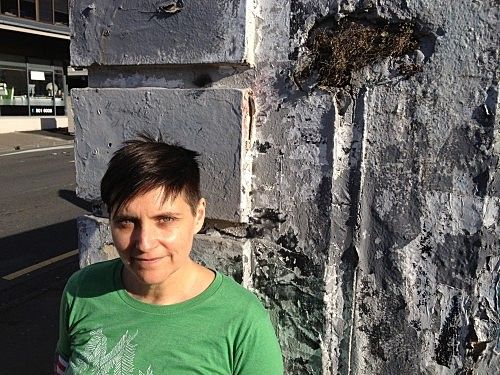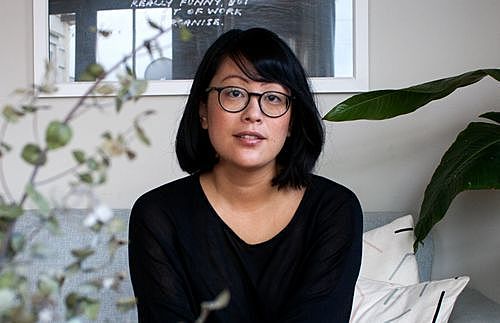Things That Baffle Me, That Confound Me, That Make Me Sad
Pip Adam: 2011 winner of the Best First Book Award for Fiction, and now officially one of the New Generation. We talk to her about winning the award, her influences, and the story she holds dearest to her heart.
“It was this moment of blackness,” says Pip Adam, “Quickly followed by a feeling like it couldn’t be true.” She’s describing the moment she found out she was one of the recipients of this year’s New Generation Award. “The phone conversation was interesting,” she continues, “It took a while for Simon [Bowden, Executive Director of the Arts Foundation] to tell me why he was calling, and when he did, I didn’t totally believe him. Well,” she corrects herself, “I believed him in the moment, but then when I rang up Brent to tell him, I just kept thinking, “That can’t be right. I must have this wrong.”
She didn’t have it wrong, of course, and last Wednesday she found herself surrounded by flocks of philanthropists at dusk, all waiting in anticipation of The Macqaurie Private Wealth New Zealand Arts Awards. Its name is longer than its history. Established last year by The Arts Foundation, the venture is philanthropy at its purest. Artists don’t apply for the awards. They don’t even know they’re being considered for one. They’re nominated by a panel of their peers for any number of categories, among these the New Generation Awards, which are worth $25,000 and are given to promising artists in the beginning stages of their careers. This year’s recipients were Shigeyuki Kihara, the first New Zealander to have a solo exhibition at MoMA, dancer and choreographer Cameron McMillan, and Adam, whose collection of short stories Everything We Hoped For won the NZSA Hubert Church Best First Book Award for Fiction last year (for a full list of the recipients, see here).
I ask her which of her stories so far is her favourite. “I have quite a warm spot for ‘The Kiss’,” she says. “I think because it was the first ‘story’ I wrote. Up until I wrote it, I’d been writing these bitty, kind of fragmented things. At the same time I was reading Chekhov and starting to see and feel the power of an extended narrative, of creating a world beyond the small interiors I'd been writing and I really wanted to write something in third person past tense, and I didn't know how, so I copied Chekhov.”
For her, this was a moment where reading and writing really came together. “I was in Paris once,” she explains, “like, for 24 hours, and we went to the Louvre and I saw all these people with easels up copying the paintings on the wall, they were learning by impersonation, and this kind of made me wonder if you could do that with writing. I put my soldiers in Christchurch but I followed Chekhov's structure, word for word. Like, he begins, 'At eight o'clock on the evening of the twentieth of May all the six batteries of the N---- Reserve Artillery Brigade halted for the night in the village of Myestetchki on their way to camp.' So I began, 'At six o'clock on the morning of the sixteenth of December, the soldiers of Echo Company woke in Dili, showered, dressed in civilian clothes and made their way to the vehicles that would take them to the plane that would take them home.' And that's how I wrote the first draft. This broke my writing in a very useful way.”
‘The Kiss’ is also important to her for another reason: it was the first story she finished after her MA year, the fruits of which were Everything We Hoped For. “The time after the MA was frightening for me.,” she tells me. “I really thought, 'Maybe I can't write by myself. Maybe everything I've done, has been done because of my supervisor and my classmates.”
It’s what she finds the most challenging about writing. “I find it really hard to turn my head off. I have this internal dialogue which tells me the writing’s shit, that I'm shit, that no one wants to hear it. It replays every nasty thing anyone's ever said. The big problem with that is not any kind of battle for self-confidence, but the fact I start writing toward that dialogue. I start trying to make the people in my head happy and that is a recipe for disaster.” She stops. “Maybe the nice things people say are just as dangerous, if I try to write toward those.”
‘The Kiss’ had its first iteration during her MA, but it wasn’t working. “Everyone who read it knew it,” she says, “so I had to rewrite it by myself, and that was so scary, but I did it, and it got published in Sport and it was one of those moments where I thought, 'Maybe I can do this.'”
“The other reason I feel a kind of happiness around this story is because, well, I'm sure it's no surprise that it comes from 'something real' and I care a great deal for the 'someone real' that this story orbits around, and I feel like this story gave me a chance to be kinder than I was in real life, and to offer that person a moment of freedom, a moment of being completely who they were that they never got while they were alive. Yeah, so writing is amazing like that. Not that it makes any difference to anyone else, it is such an amazing way of working out things that baffle me, that confound me, that make me sad.”
She didn’t read much when she was younger. “I sort of stopped reading around the time I left school, which was about 16 years old and by the time I started reading again it was really haphazard and unguided.” A lot of her influences come from elsewhere – from television and music and film. “I feel like I’ve learnt most of what I know about narrative and character from TV and film. I have this one story that I keep writing, a man loves another man who can’t love him back. Last year I re-watched My Own Private Idaho for the first time in maybe twenty years and I realised my story is the story that is played out around the fire in this film.”
The other great influence on her writing is music. “I get jealous of musicians, that they have the second non-verbal emotion-making force in their work. I think this is why I like poetry so much. I want to tell a story as much through sound as meaning - if that makes sense. That's why I love Gary Lutz and Joseph Conrad and David Foster Wallace so much I think, there's a noise in their work, like an underlying tone which is similar to music.”
“I really hope we go travelling,” she says, when I ask her what she plans to do with the prize money. “But, yeah, I get frightened often and we make these big plans and then I chicken out and we do the safe thing. But I hope we go on some crazy, not very well thought out trip across America - I love Ronald Hugh Morrieson,” she adds, “but I get real scared sometimes that I'll never leave Wellington again.”
*
Read a new story by Pip Adam, C U C K OL D E D, here.


